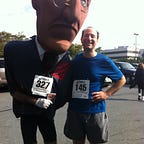The GOP Debates: A Modest Proposal
The first Republican presidential debate is just hours away, and it promises — despite the many outsized personalities involved — to be boring.
There has been some controversy over the Fox News channel’s stewardshipover the GOP presidential debates. Using a combination of polls, Fox will identify the top ten candidates from an enormous GOP field and invite them, but excluding the others candidates. This is a problematic methodology since among the bottom tier of candidates an advantage in the polls may be within the margin of error. Some wonder exactly who is Fox News to arbitrate the legitimacy of a presidential candidate?
More importantly, regardless of how many candidates participate, how will the American public possibly get a sense of any of these individuals in the current format. Two hours is 120 minutes. After throat-clearing and harrumphing it is really only 100. With 10 candidates, we’ll barely see ten minutes of their actually telling us what they think and want to do. With sixteen candidates that drops to six minutes each. How can we possibly learn anything interesting or important in that time?
Worse, given such constraints, the candidates will have little incentive to offer more than sound bites and jabs at one another.
Instead, let’s do something interesting, maybe more along the lines of March Madness. Have two candidates square off for a half hour debate: three questions to each candidate in which the questioned candidate gets three minutes to respond and the opponent gets a two minute rebuttal. The seeds could be determined by poll rankings and questions could be selected randomly from a pre-drawn set on a variety of topics. Top tier candidates like Jeb Bush would pair off against lesser-known figures, while mid-tier candidates would go head to head.
It might be interesting to reveal the first round of debates only days (or even hours) beforehand so the candidates cannot spend too much time preparing for a specific opponent. Instead the American public would get a better sense of how these candidates think on their feet. The winner could be decided through instant polling of the viewing audience, TV viewers, experts/pundits, or some combination these groups.
Winners would go on to face other winners until we reached the final two and had a victor.
The advantages are considerable. The American people will get a good close-up look at the individuals who seek to become their president. Lesser known candidates will have the opportunity to shine. But losing will not eliminate a candidate — good performances, even for losers of a particular debate, will leave a good impression on the viewers.
This is an imperfect system and arguably it might contribute to the reduction of politics to entertainment. But truthfully, the American presidential selection process has always been imperfect and the rise of politainment is hardly a new phenomenon. In the 1800s political rallies were basically giant parties and spectators came out to hear candidates orate for hours. Abraham Lincoln established his national reputation debating Stephen Douglas in the 1858 Illinois Senate campaign.
The great risk with the campaign season starting so very early is voter fatigue. If the GOP wants keep the public’s attention, they should really try to make the campaign interesting.
Aaron Mannes is a researcher at the University of Maryland and he writes about presidents and vice presidents on his blog Veepcritique.
